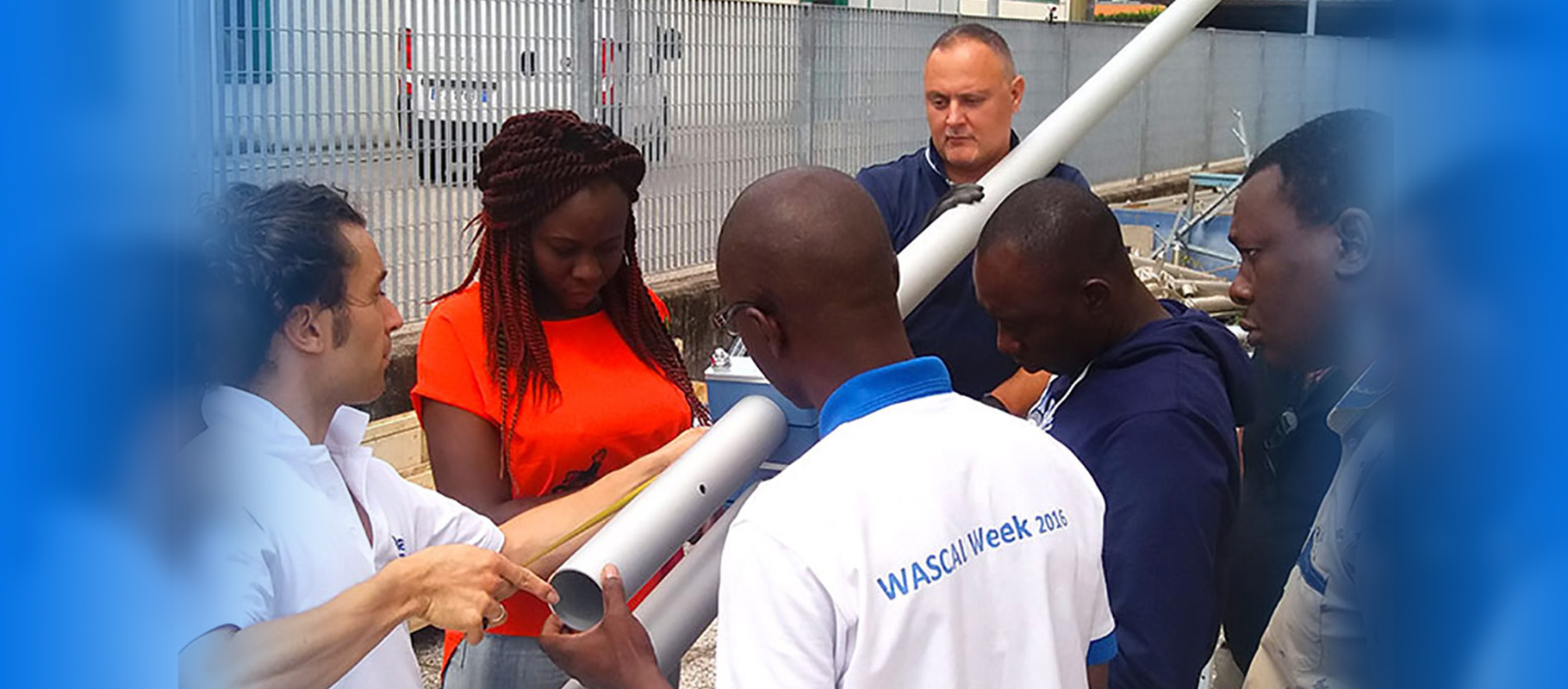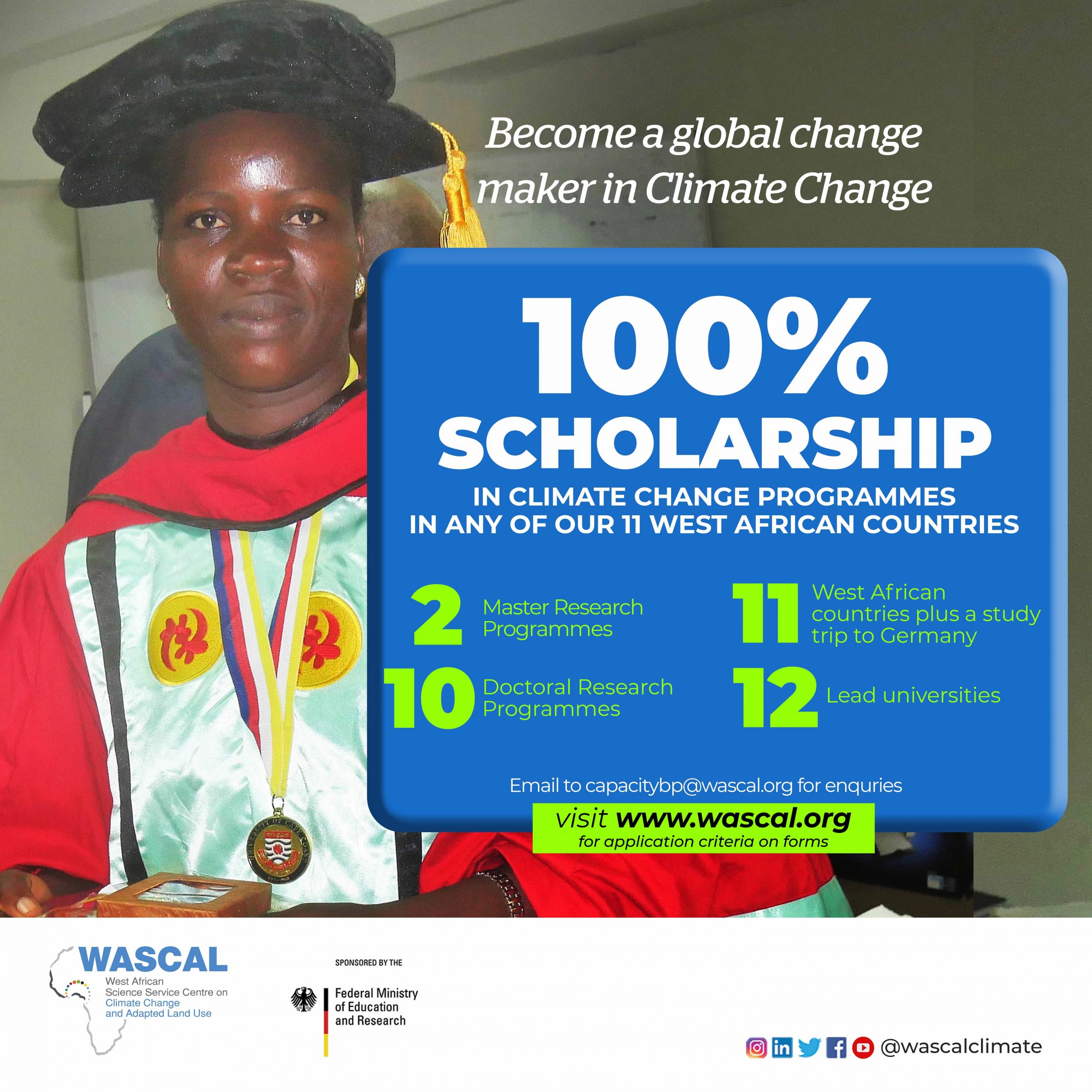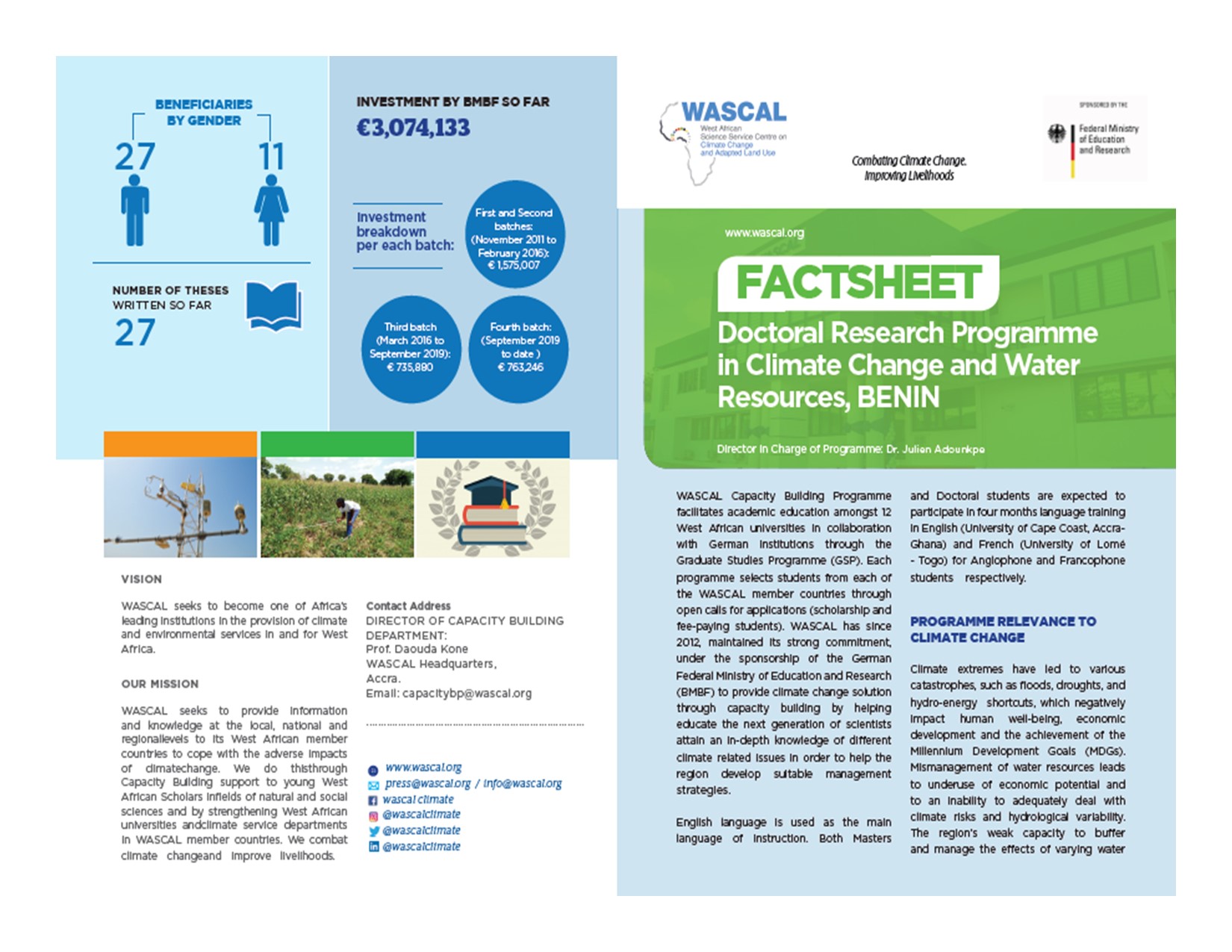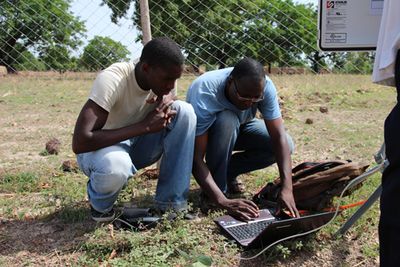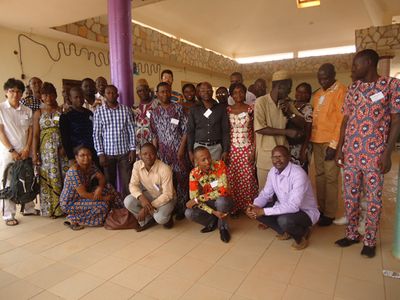West Africa is vulnerable to high water risk, facing the dangers of hunger, disease, energy shortages, and poverty due to several factors caused by water scarcity, pollution, and flooding. As Continue Reading
After the Gambia and Cabo Verde, WASCAL, through the Competence Centre has officially handed over seven (7) Automatic Hydro Sensor to the Republic of Benin for the benefit of the Continue Reading
Download the Application Form Below Application Form – Master Research Program on Informatics for Climate Change Université Joseph KI-ZERBO, Ouagadougou Download the Application Form Below Application Form – PhD in Continue Reading
DOWNLOAD LINK: https://wascal.org/wp-content/uploads/2021/02/FACTSHEET-CLIMATE-CHANGE-AND-WATER-RESOURCES-BENIN-3.pdf
3RD WASCAL MINISTERIAL COUNCIL MEETING Opening speech by HE Ms Marie Odile ATTANASSO
Please note: The call for application has been extended to January 22, 2016.
WASCAL (West African Science Service Center on Climate Change and Adapted Land Use) is a large-scale research-focused Climate Service Center designed to help tackle severe challenges posed by climate change and thereby enhance the resilience of human and environmental systems to climate change and increased variability. It does so by strengthening the research infrastructure and capacity in West Africa related to climate change and by pooling the expertise of ten West African countries and Germany. Through the Graduate Studies Program WASCAL’s Capacity Building Program helps educate the next generation of scientists to attain an intimate knowledge of different climate related issues in order to help the region develop suitable management strategies.
The WASCAL Graduate Studies Program supports four Master’s and six Doctoral Programs implemented at ten lead Universities across West African countries. WASCAL provides full scholarships to the Doctoral and Master’s students in all the ten lead Universities with comprehensive training and research support. Doctoral students may spend up to six months at a host institution in Germany. The language of instruction is English. English and French language training programs are provided for all graduate students. Graduate students have access to the research facilities set up through WASCAL funding and located at various watersheds in West Africa. German partner universities collaborate with the Doctoral and Master’s Programs in the areas of curriculum development, visiting professorships and co-supervision of graduate students.
The WASCAL Graduate Studies Program offers its students:
High quality research and education on climate change and its impact on human environmental systems.
Up to six months at a host institution in Germany (Doctoral Programs only!)
Interdisciplinary working approach
International lecturers and supervisors
English language classes
Scholarship and research budget, including a personal laptop computer
Doctoral Programs
West African Climate System
Federal University of Technology, Akure (FUTA), Nigeria
Apply now: Download call for applications and application form and the recommendation letter
Climate Change and Water Resources
Université d’Abomey-Calavi (UAC), Benin
Apply now: Download call for applications and application form
Climate Change Economics
Université Cheikh Anta Diop de Dakar (UCAD), Senegal
Apply now: Download call for applications and application form
Climate Change and Biodiversity
Université Felix Houphouet Boigny (formerly Université de Cocody‐Abidjan), Côte d‘Ivoire
Apply now: Download call for applications and application form
Climate Change and Land Use
Kwame Nkrumah University of Science and Technology (KNUST), Ghana
Apply now: Download call for applications and referee form and application form
Climate Change and Agriculture
L’Institut Polytechnique Rural de Formation et de Recherche Appliquée, (IPR-IFRA), Mali and University of Cape Coast, Ghana
Apply now: Download call for applications and application form
Time Frame
The time frame of the doctoral programs is three and a half years. During the first three months, students take English and/or French language classes and common courses at the language centers. During the next 6 months student participate in lectures at their Graduate Research Program and prepare their proposals. After their proposals have been approved by their supervisors, the students conduct their field research for 12 to 24 months. For the remaining period of time, students will write up their thesis and are offered to spend up to six months at a German host institution.
Requirements
Candidates applying for a Doctoral Program must have a Master’s degree in a relevant discipline in addition to a BSc degree (second class upper division).
Citizenship in one of the WASCAL member country (Bénin, Burkina Faso, Côte d’Ivoire, The Gambia, Ghana, Niger, Mali, Nigeria, Sénegal, Togo)
Five credits including Mathematics and English Language that are also equivalent to Francophone university grading system
Gender-balanced selection decision
Applicant should show proficiency in English Language.
Meet additional requirement of the lead university
Master’s Programs
Climate Change and Human Security
University of Lomé, Togo
Apply now: Download call for applications and application form
Climate Change and Education
University of The Gambia (UTG), The Gambia
Apply now: Download application form
Climate Change and Energy
Université Abdou Moumouni de Niamey (UAM), Niger
Apply now: Download call for applications and application form
Climate Change and Adapted Land Use
Federal University of Technology, Minna, Nigeria
Apply now: Download application form
Time Frame
The time frame for the Master’s programs is two years. During the first year students participate in the course program of their Graduate Research Program and work on their research outline. Research will be conducted during the second year within a period of six to nine months. Students finish the program with writing up their thesis during the last three to six month.
Requirements
Candidates applying for Master’s Program must have a minimum BSc degree (second class upper division) in a discipline relevant to the respective program.
Citizenship in one of the WASCAL member country (Bénin, Burkina Faso, Côte d’Ivoire, The Gambia, Ghana, Niger, Mali, Nigeria, Sénegal, Togo)
Five credits including Mathematics and English Language that are also equivalent to Francophone university grading system
Gender-balanced selection decision
Applicant should show proficiency in English Language.
Meet additional requirement of the lead university
Application Process
The application process is handled jointly by WASCAL and the individual Graduate Programs. Applications can be submitted online to any of the Graduate Studies Program for the 2015/2015 season until January 22, 2016. The details of the application process can be found at the respective programs pages (see linkes above). Shortlisted candidates will be contacted and invited for interviews by January 29, 2016.
More information on the Graduate Studies Program and on open applications can be found here or at the respective universities websites.
Update: The deadline has been postponed to february 29, 2016
Applicants must have completed all course requirements for the degree as well as be in the research and/or writing phase of the dissertation. The dissertation must be on climate change and any of the thematic areas of biodiversity, agriculture, adapted land use, climate systems, education, human security, economics and energy. In addition, applicants should not have received any other funding to support the dissertation activities outlined in the PhD or MSc proposal/budget. Priority is given to candidates pursuing a career in government ministries, research and/or teaching at a public institution in West Africa.
Requests should be supported by the following documentation:
Evidence of an attachment to, or sponsorship by, an institution in West Africa engaged in government ministries, research and/or training in the public sector in the region.
Evidence of registration in a recognized PhD or MSc program in a relevant area.
An approved research proposal, complete with clearly defined objectives, substantial literature review and a well-outlined analytical framework, as well as pertinent research methodology.
A statement of limitations and policy relevance of the study.
A letter of reference from the thesis supervisor, and a letter of institutional support from the Head of Department.
A detailed budget including evidence of any additional financial support that may be necessary to complete the program.
Curriculum vitae.
Processing of Application for PhD Thesis Research Award
Upon the receipt of the proposal and the supporting documentation, it is sent to two external reviewers in the relevant programs of the WASCAL Graduate Studies Program, who comment on the adequacy of the proposal. In the event that the reviewers suggest corrections to be made and give positive feedback, the comments are sent to the students to incorporate and then resubmit the revised proposal for a final review. Once the proposal is cleared by at least two reviewers, it is presented together with the comments from the external reviewers to the Thesis Grant Sub-Committee of the Graduate Studies Program, who will go through the recommendations of the reviewers and make recommendation to the Capacity Building Department of WASCAL to approve for thesis funding. It is after this that research grants can be awarded.
Application Deadlines for 2015/2016 Academic Session
The PhD and MSc Thesis Research Awards applications deadline is January 30, February 29, 2016.
Proposal and supporting documents for thesis grant should be sent to:
The Director of Capacity Building,
WASCAL Accra Office, CSIR Office Complex,
Agostino Neto Road, Airport Residential Area, PMB CT 504, Cantonments-Accra.
Email: intern.w(at)wascal.org; weto.s(at)wascal.org
Note: The call for application has been extended to January 22, 2016. Read more
WASCAL (West African Science Service Center on Climate Change and Adapted Land Use) is a large-scale research-focused Climate Service Center designed to help tackle severe challenges posed by climate change and thereby enhance the resilience of human and environmental systems to climate change and increased variability. It does so by strengthening the research infrastructure and capacity in West Africa related to climate change and by pooling the expertise of ten West African countries and Germany. Through the Graduate Studies Program WASCAL’s Capacity Building Program helps educate the next generation of scientists to attain an intimate knowledge of different climate related issues in order to help the region develop suitable management strategies.
The WASCAL Graduate Studies Program supports four Master’s and six Doctoral Programs implemented at ten lead Universities across West African countries. WASCAL provides full scholarships to the Doctoral and Master’s students in all the ten lead Universities with comprehensive training and research support. Doctoral students may spend up to six months at a host institution in Germany. The language of instruction is English. English and French language training programs are provided for all graduate students. Graduate students have access to the research facilities set up through WASCAL funding and located at various watersheds in West Africa. German partner universities collaborate with the Doctoral and Master’s Programs in the areas of curriculum development, visiting professorships and co-supervision of graduate students.
The WASCAL Graduate Studies Program offers its students:
High quality research and education on climate change and its impact on human environmental systems.
Up to six months at a host institution in Germany (Doctoral Programs only!)
Interdisciplinary working approach
International lecturers and supervisors
English language classes
Scholarship and research budget, including a personal laptop computer
Doctoral Programs
West African Climate System
Federal University of Technology, Akure (FUTA), Nigeria
Apply now: Download call for applications and application form and the recommendation letter
Climate Change and Water Resources
Université d’Abomey-Calavi (UAC), Benin
Apply now: Download call for applications and application form
Climate Change Economics
Université Cheikh Anta Diop de Dakar (UCAD), Senegal
Apply now: Download call for applications and application form
Climate Change and Biodiversity
Université Felix Houphouet Boigny (formerly Université de Cocody‐Abidjan), Côte d‘Ivoire
Apply now: Download call for applications and application form
Climate Change and Land Use
Kwame Nkrumah University of Science and Technology (KNUST), Ghana
Apply now: Download call for applications and referee form and application form
Climate Change and Agriculture
L’Institut Polytechnique Rural de Formation et de Recherche Appliquée, (IPR-IFRA), Mali and University of Cape Coast, Ghana
Apply now: Download call for applications and application form
Time Frame
The time frame of the doctoral programs is three and a half years. During the first three months, students take English and/or French language classes and common courses at the language centers. During the next 6 months student participate in lectures at their Graduate Research Program and prepare their proposals. After their proposals have been approved by their supervisors, the students conduct their field research for 12 to 24 months. For the remaining period of time, students will write up their thesis and are offered to spend up to six months at a German host institution.
Requirements
Candidates applying for a Doctoral Program must have a Master’s degree in a relevant discipline in addition to a BSc degree (second class upper division).
Citizenship in one of the WASCAL member country (Bénin, Burkina Faso, Côte d’Ivoire, The Gambia, Ghana, Niger, Mali, Nigeria, Sénegal, Togo)
Five credits including Mathematics and English Language that are also equivalent to Francophone university grading system
Gender-balanced selection decision
Applicant should show proficiency in English Language.
Meet additional requirement of the lead university
Master’s Programs
Climate Change and Human Security
University of Lomé, Togo
Apply now: Download call for applications and application form
Climate Change and Education
University of The Gambia (UTG), The Gambia
Apply now: Download application form
Climate Change and Energy
Université Abdou Moumouni de Niamey (UAM), Niger
Apply now: Download call for applications and application form
Climate Change and Adapted Land Use
Federal University of Technology, Minna, Nigeria
Apply now: Download application form
Time Frame
The time frame for the Master’s programs is two years. During the first year students participate in the course program of their Graduate Research Program and work on their research outline. Research will be conducted during the second year within a period of six to nine months. Students finish the program with writing up their thesis during the last three to six month.
Requirements
Candidates applying for Master’s Program must have a minimum BSc degree (second class upper division) in a discipline relevant to the respective program.
Citizenship in one of the WASCAL member country (Bénin, Burkina Faso, Côte d’Ivoire, The Gambia, Ghana, Niger, Mali, Nigeria, Sénegal, Togo)
Five credits including Mathematics and English Language that are also equivalent to Francophone university grading system
Gender-balanced selection decision
Applicant should show proficiency in English Language.
Meet additional requirement of the lead university
Application Process
Note: The call for application has been extended to January 22, 2016. Read more
The application process is handled jointly by WASCAL and the individual Graduate Programs. Applications can be submitted online to any of the Graduate Studies Program for the 2015/2015 season until January 8, 2016. The details of the application process can be found at the respective programs pages (see linkes above). Shortlisted candidates will be contacted and invited for interviews by January 15, 2016.
More information on the Graduate Studies Program and on open applications can be found here or at the respective universities websites.
The workshop was organized around four main themes and aimed to give greater visibility to research activities of WASCAL in Benin and to stimulate discussions and exchange among researchers, local communities and authorities on strategies of resilience to environmental and climate changes.
The four themes of the workshop were:
Challenges of field research in the study of populations and environmental and climate change
Collected data documentary relationship on environmental/climate change and population dynamics in northern Benin
Rural resilience to Climate Change in the northern Benin
Local resilience actions versus interim results Restitution
Chaired by the representative of the municipality of Matéri, the workshop was opened by Adolphe Sétondji Avocanh, Coordinator of the Dassari Watershed. During his welcome speech he stressed the importance of a constructive exchange on climate change effects, population dynamics and the impact of these changes on existing natural resources. He further presented WASCAL and its objectives, its centers of interests and the role of the involved stakeholders.
Papa Sow (WASCAL, ZEF), who initiated the workshop, emphazised the importance of exchange between all invited actors for a better understanding of climate change and its impacts on natural resources in the region. He further outlied the workshop objectives and presented his research on climate change and population dynamics, where he and his team focus on social aspects of climate change with a perspective from the social sciences to find solution-oriented approaches to adverse effects related to climate and extreme natural events.
The workshop offered an opportunity to present and discuss the interim research results with the participants and to submit the interim results to critical examination. The participants gave valuable feedback and supported the research with additional information. After two days of debate the discussions among participants of the workshop diverged on to the possibility of an institutional partnership, writing scientific research projects under the umbrella of WASCAL and future collaborations between scientists, local populations and policy makers.
Organization Committee
Adolphe Sétondji Avocanh, WASCAL Coordination Unit of the Dassari watershed in Tanguiéta.
Email: a.avocanh(at)yahoo.fr
Phones: 0022995151808 / 00229-97540798/ 00229-90987818
Jane Maureen Ngonjock
Email: janescorpy(at)gmail.com
Yasmina Adebi, Téléphone: 0022997160464
Email: yadebi(at)yahoo.fr
Scientific Committee
Papa Sow, Researcher, Center for Development Research, University of Bonn (Germany)
Boubacar Barry, Director of the WASCAL Competence Center, Ouagadougou (Burkina Faso)
William Fonta, Researcher WASCAL Competence Center Ouagadougou (Burkina Faso)
Karen Greenough, Researcher WASCAL Competence Center Ouagadougou (Burkina Faso)
Daniel Callo-Concha, Researcher, Center for Development Research, University of Bonn (Germany)
Kiansi Yantibossi, Executive Secretary U-AVIGREF
N´Sera Midama Parfait, Head of Ecology Service, Pendjari National Park
For further information, please download the flyer or the program in English or French:
Download program in English
Download Flyer in English
Download program in French
Download Flyer in French


